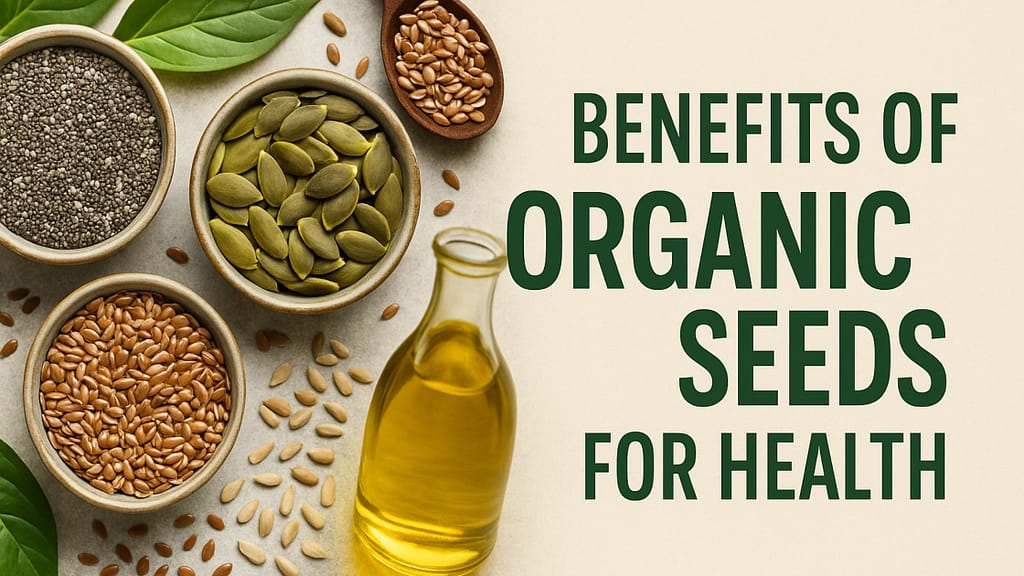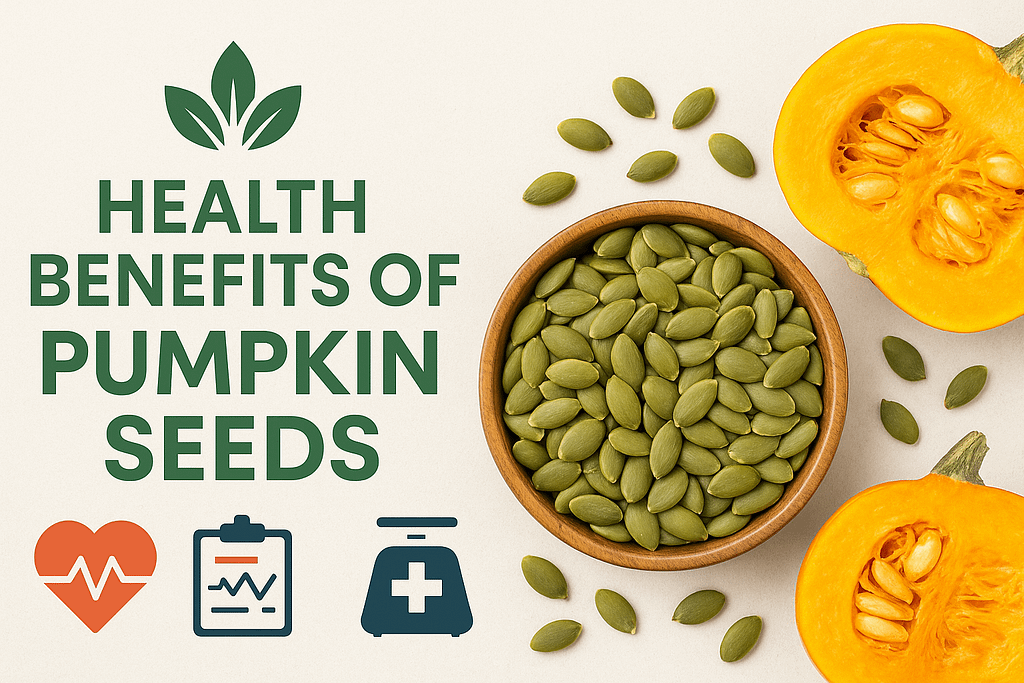Introduction
When you ask yourself why nutritionists are so pumped about pumpkin seeds, you are about to discover. These small green powerhouses are no seasonal punch line – they are full of nutrients that can actually make a difference to your health in ways that you would not imagine.
Today we are going to discuss the true health benefits of pumpkin seeds, including helping your heart and sleep quality, as well as immune support and more. You’ll see by the end why these small seeds should always have an honored place in your pantry.
What’s Actually Inside Pumpkin Seeds?
And before we get into the benefits, we should consider what makes pumpkin seeds so good as far as nutrition is concerned. One packet (approximately 28 grams or a small handful) has about:
- 163 calories
- 8.5g protein (more than most nuts)
- 13.9g healthy fats
- 156mg magnesium (nearly 40% of daily needs)
- 2.2mg zinc (20% of daily needs)
- Plus iron, phosphorus, fiber, and vitamin E
The magic is in that nutrient density. Each small portion gives you several important minerals and healthy fats, so it is no wonder why the health benefits of pumpkin seeds are this extensive.
Heart Health and Blood Sugar Support
Your heart will adore pumpkin seeds, and this is how: magnesium, healthy fats, and fiber are a combination that will help the heart in a variety of ways.
The magnesium aids in the normal regulation of blood pressure and the monounsaturated and polyunsaturated fats might aid in the improvement of cholesterol levels. In one study of postmenopausal women, pumpkin seed oil lowered diastolic blood pressure by seven percent and raised desirable HDL cholesterol by 16 percent in a 12-week duration.
When it comes to managing blood sugar, the amount of fiber in it also contributes to slowing down the digestion process and avoiding those energy rushes and crashes that make you want to have an extra snack. Even the protein helps make the eating experience more prolonged, and it, of course, promotes good eating habits.
Better Sleep and Mood Support
Struggling with sleep? Your new snack may be pumpkin seeds before bedtime. They are full of tryptophan the same amino acid that causes you to feel sleepy after eating a Thanksgiving dinner. Tryptophan is converted into serotonin by your body and this is further converted to melatonin – your natural sleep hormone.
But that’s not all. Pumpkin seeds contain magnesium that works as a tranquilizer and can be used to calm down the nervous system before sleep. There are some individuals who believe that just a few seeds of pumpkin about a hour before they retire to bed will put them to sleep.
The positive effects of mood go beyond sleep as well. Sufficient levels of zinc, pumpkin seeds supply, are associated with emotional control and fewer depressive symptoms.
Immune System Boost
Nutrients are what make your immune system work and pumpkin seeds provide a few of the most important ones. Zinc is likely the most significant one – it is responsible to the functioning of immune cells and wound healing. Pumpkin seeds are a smart addition to your diet because many people are mildly deficient in zinc without even knowing it.
Pumpkin seeds also contain vitamin E and antioxidants that help prevent cell damage that occurs as a result of free radicals. This antioxidant effect is beneficial to your general well-being and can help decrease inflammation in your body.
Other minerals in pumpkin seeds (iron) aids in the production of healthy red blood cells and aids in the movement of oxygen (iron is very important in keeping energy and immune systems strong).
Prostate and Urinary Health
In men particularly, pumpkin seeds have specific benefits to the prostate. Research indicates that pumpkin seed oil may be used to relieve symptoms of benign prostatic hyperplasia (BPH), an unpleasant disease that causes problems with urination in old age.
Zinc and healthy fats seem to be beneficial to prostate performance, and, in fact, some studies have suggested that frequent intake could prevent the onset of prostate-related problems initially.
Pumpkin seeds could be of interest to both men and women as they have the potential to positively affect the urinary tract, and some studies indicate an improvement in symptoms associated with the overactive bladder.
Bone Health Foundation
Calcium is not the only thing that your bones need: they need a complex of minerals that interact with each other. Pumpkin seeds contain various nutrients which support the bones: magnesium, zinc, phosphorus.
Magnesium is especially valuable since it can assist your body to actually utilize the calcium that you take. Calcium cannot do its work efficiently without proper magnesium. Pumpkin seeds are a simple way to increase magnesium because many adults lack sufficient magnesium in their diets.
Digestive Health Support
Pumpkin seeds contain fiber that aids in the normal digestion of food, particularly when you consume the seeds with the shells intact. This fiber nourishes the healthy gut bacteria and serves to keep the bowel regular.
But, when you are not accustomed to the high intake of fibers, you should begin gradually. Excessive consumption of these over a short period of time may lead to bloating or stomach upsets. Start with a tablespoon and slowly build up because your digestive system gets used to it.
Hair, Skin, and Reproductive Health
Zinc, vitamin E and healthy fats in pumpkin seeds work together to keep the hair and skin healthy both inside and out. Pumpkin seeds are a natural beauty food because zinc deficiency may cause skin issues and hair loss.
Zinc has important effects on male and female fertility in terms of reproductive health. In men, healthy levels of zinc are associated with healthy levels of testosterone and healthy sperms. In women, zinc plays a role in hormone balance and reproductive activity.
How to Include Pumpkin Seeds in Your Diet
Daily portions of 1/4 cup or one ounce are recommended – not too much or too little to gain the benefits. Here are viable methods of enjoying them:
Raw or roasted: Both are fine, but light roasting may be a better way to add flavor, and antioxidants can be more available through light roasting. Simply do not over-roast them which can destroy the healthy fats.
In food: Sprinkle over salads, yogurt or oats. Add to smoothies as an additional source of protein and to make it creamy. Add to self-made trail mix or granola.
As snacks: It is good to have a small container in the workplace or in your vehicle where you can have a satisfying snack.
Ground up: You can grind pumpkin seeds into a powder to add to smoothies or baked goods if you prefer not to chew whole seeds.
Safety and Considerations
Most people are very safe with pumpkin seeds, but there are some things to consider:
When you are not accustomed to high-fiber diets, you should add pumpkin seeds slowly, so as not to cause stomach problems. When taking more fiber, always drink more water.
But in rare cases, there are individuals who might be allergic to pumpkin seeds. Stop consuming them in case of any allergic reactions.
The calories will accumulate and if you are concerned about your weight, then eat the recommended portions. One quarter cup has approximately 180-200 calories.
Choosing and Storing Pumpkin Seeds
Find fresh and nutty not rancid pumpkin seeds. Keep them in refrigerator or in airtight storage container up to six months, or freeze them.
You may purchase them shelled (pepitas) or hulled. The hulled seeds are less difficult to digest and eat compared to those with shells, which are more fibrous.
FAQs
How many pumpkin seeds should I eat daily? About 1/4 cup (28-30g) provides significant nutritional benefits without excessive calories. This gives you a good dose of magnesium, zinc, and healthy fats.
Are roasted pumpkin seeds as healthy as raw ones? Light roasting preserves most nutrients and may actually increase some antioxidants. Avoid heavily salted or over-roasted varieties that can damage the healthy fats.
Can pumpkin seeds really help with sleep? Yes, they contain tryptophan, magnesium, and zinc — all nutrients that support better sleep quality. Try eating a small handful about an hour before bedtime.
Do pumpkin seeds help with prostate health? Research suggests pumpkin seed oil can help reduce BPH symptoms and support overall prostate health, likely due to the zinc content and beneficial fats.
Should I eat pumpkin seeds with or without shells? Both are fine. Shells provide extra fiber, while hulled seeds (pepitas) are easier to digest and still provide the key nutrients.
Conclusion
Pumpkin seeds have health benefits far beyond anything you could reasonably expect of this tiny food. These tiny seeds have a significant nutritional value, whether to strengthen the heart, improve sleep, enhance immunity, or to enrich the essential minerals.
The best part? They are cheap and shelf-stable, and can fit into your current food habit. Either sprinkled in your morning oatmeal, pureed into smoothies, or just taking a handful to have as a snack in the afternoon, you are providing your body with nutrients it really wants.
Ready to give them a try? Eat a little amount and observe your body. Within a few weeks of the regular use, many people observe the improvement of energy and the quality of sleep. Your body– and, more so, your heart, immune system, and sleep patterns– will probably be grateful that you added this easy thing to your daily routine.



